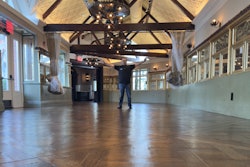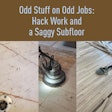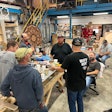
Whether you call it bartering or a trade out, it’s an economic system that’s been around for centuries and can serve a useful purpose when applied properly. In my situation, I got a crash course in it because I was dirt poor when I started my business. The proverbial indigent church mouse lived a lavish lifestyle compared to mine, and the only pet I could afford was the possum that hung out around the dumpster at my apartments. I learned some lessons and experiences along the way I’d like to share, and I hope you’ll share yours with me.
My first trade out was based on need. I started my business in a depressed area of the city, but it had a high demand for my services because it was going through gentrification. The fact other contractors were not inclined to work in this area increased the value of my labor and enabled me to trade refinishing one unit for three months of rent in the three-story walk-up I called home. I quickly learned Rule No. 1: Know the value of your hourly labor costs, because that’s the currency you are inventing. Materials and overhead are a constant, but labor is the variable that gives you the “purchasing power” and can fluctuate with demand.
The apartments were known as the Lizzie T, short for Elizabeth Terrace, and I had a blast living there and experiencing the transition from a depressed inner-city neighborhood into one of the most highly sought after neighborhoods in Atlanta. My neighbors in the building were my best advertising, and they had no problem when I wanted to bring a potential client over to view my work. I managed three years at Lizzie without writing one check for rent.
My second most memorable trade out involved an elderly couple, Willis and Milly Simmons, who were antique dealers. They had bought a farmhouse 40 miles outside Atlanta and wanted to refurbish it and move their antique business there. They brought up the subject of a trade out and I was very transparent with them. I whipped out my estimate pad and showed them what I charged per square foot. I took that number and then backed out my fixed costs to show them what my labor charges were. I told them I would trade my labor for pieces of furniture at the price they paid for it. We struck a deal, and I’ve still got some of the pieces, including this one:
What really sweetened the deal was the time I spent on their farm around a campfire drinking beer and listening to Willis tell me about his time in the South Pacific during WWII. Willis was a natural, and I was mesmerized by the guys stories. This was long before they became known as the “greatest generation,” butI knew then that there was something special about that crowd.
I will still occasionally do a trade out, especially if it helps me wade through new technology. My first website was a trade out, and it went a long way in helping me understand what a useful tool they can be to get a basic introduction to clients along with providing them information I often forgot to provide them.
One thing to note: When you do trade out agreements, you still have to pay your taxes!
So, I did my part to keep this antique form of commerce alive, had fun doing it and learned a different value system. How about you? What have your trade outs bought you?

































